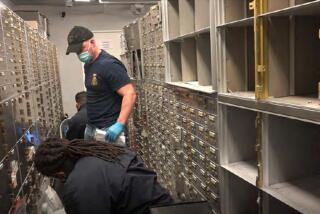Twists, Turns of Rental-Car Insurance
- Share via
Question: My wife’s automobile was rear-ended in a collision, and the other driver’s insurance company rented a car for her while hers was being repaired. Unfortunately, neither the other driver’s insurance company nor ours would pay for the car-rental company’s collision damage waiver. Who should have paid for it (if it should be paid at all)?--W.R.D.
Answer: She got hit by an insured motorist? If you live long enough, you’ll encounter everything, apparently.
The collision damage waiver (CDW) has been a source of controversy for a long time, according to Tim Dove, the Insurance Information Institute’s regional manager in San Francisco.
The first question is simply: Do you really need it in the first place? The second is: If you buy it, is the daily rate charged by the car-rental companies fair? The cost can range from $7 to $10 a day, which translates as an annual premium of $2,555 to $3,650. And the ancillary question is simply: What, exactly, are you buying?
All of the major car-rental companies carry deductibles on their cars of about $2,500 in the event of collision. (And a couple of them, Alamo and General, make you responsible for the full value of the car, according to Consumer Reports’ most recent study of the 10 largest rental firms.) This means that in the event of an accident, you are responsible for everything up to the deductible (or the full value).
“But most drivers’ (personal) car insurance,” Dove adds, “covers them when they’re in a rented car and with the same deductible as if they were driving their own car.”
However, Consumer Reports warns, even when your own policy covers you, some policies have a ceiling of $500 to $1,000 on the company’s liability when a rented car is involved. So, obviously, it’s a good idea to read your policy carefully or ask your agent about it before you blithely decline such coverage.
So, if your own policy covers you as if you were driving your own car, why should you buy the rental company’s CDW in the first place?
“Some people,” Dove says, “buy it simply as a convenience. If they’re in an accident, it means that they’re going to have to contact the local claim office of their company and make the proper arrangements. It can mean a delay and a possible hassle. If they’ve bought the rental company’s CDW, they can just turn the car back to the company and let them handle it.” The price of such convenience, of course, is a little on the high side.
Now, in your instance, who--if anyone--should have bought your wife’s CDW on the rental car while hers was being repaired?
You can’t really quote chapter and verse on this, the Insurance Information Institute’s Dove admits, because the whole question is a subjective, “good faith” matter.
But the feeling in the industry, he adds, is that your insurance company is fulfilling its part of the deal--living up to the terms of its policy with you--and that the other driver’s insurance company is also acting quite responsibly by providing the rental.
Thus, the ball is in your court. The CDW, in other words, was an option--Dove and his associates feel--that it was up to you to accept or decline. But to pay for if you did accept it.
But imagine! Being hit by an insured motorist!
Q: Your advice to a reader recently about tracking down her late father’s safe-deposit box overlooks one important point. In that column, the man from Bank of America noted that normally when the annual bill for the rental of the safe-deposit boxes arrived, it would, naturally, lead her to the right branch bank. But, the column continued, because the annual bill was apparently overlooked after her father’s death, she should retrace her steps and have the bank officers look in the inactive files, where her father’s signature card would have been moved when the rent remained unpaid.
Possibly you do not know that safe-deposit boxes were once given free of rental charges with a minimum bank balance ($1,000 for a regular box, $2,500 for a larger one). Therefore, there would never be an annual rental bill. I was given a free safe-deposit box about 18 years ago and have maintained my minimum balance and have never received a rental charge.
Also, I have a question: Can anyone ever, with a court order, get into the safe-deposit box of another under any circumstances?--R.A.T.
A: The Bank of America’s senior public relations officer in San Francisco, Larry Williams, concedes the point that in the event of a freebie safe-deposit box, there, sure enough, wouldn’t be any annual bill to tip off the heirs as to where the box is located.
“However,” he adds, “there’s invariably a bank relationship tied in with a free box--in her case, maintaining a minimum balance--and the monthly statements would clearly lead the heirs to the right branch.”
In other words: If the existence of a safe-deposit box is known to the heirs, but no annual bill for the rental turns up, then it would be logical to assume that the box is tied in with the father’s savings account at that branch. Thus, we are brought, again, to the key point: Have the branch bank officer check the inactive signature files.
Can A’s safe-deposit box be opened by B with a court order? Sure, under certain specific circumstances. A safe-deposit box’s primary advantage, after all, is--as the name implies--safety. Privacy is a second big plus, of course, but you’ll remember that even Pharaoh Tutankhamen’s treasures turned out to last something shy of that in perpetuity.
A court order, Williams said, will indeed permit the opening of a safe-deposit box--prompted, for instance, by a tax lien or, in the event of a bankruptcy, by the court’s order that all assets held by the debtor be liquidated.
Another example: If a box holder has been declared incompetent to manage his own affairs, and a conservator has been appointed by the court, the safe-deposit box, again, may be opened.
But until the box holder’s death, those are about the only ways that a box can be opened without specific, written OK--assuming that the box rent is paid up.
More to Read
Inside the business of entertainment
The Wide Shot brings you news, analysis and insights on everything from streaming wars to production — and what it all means for the future.
You may occasionally receive promotional content from the Los Angeles Times.










